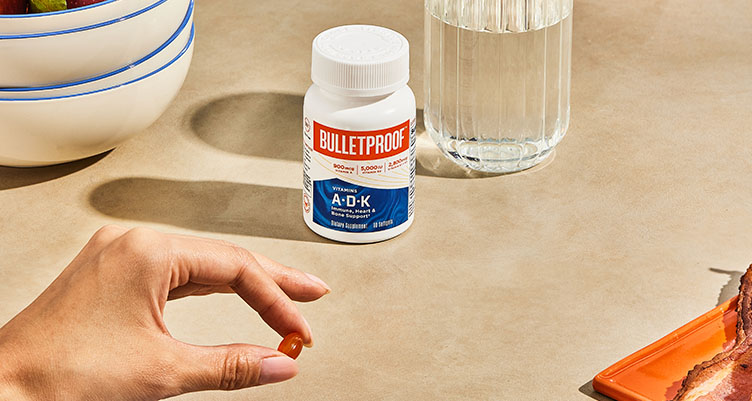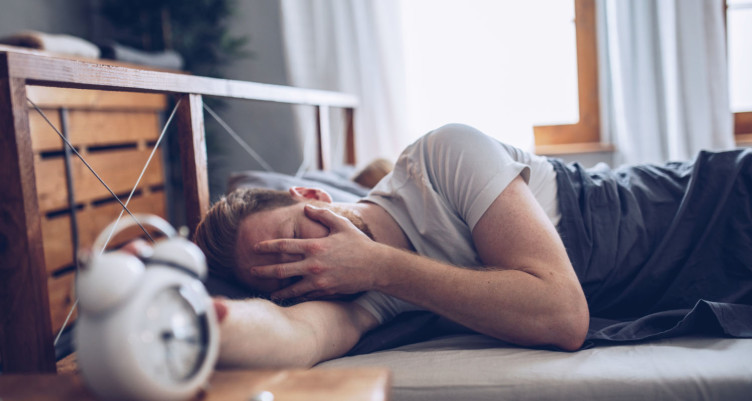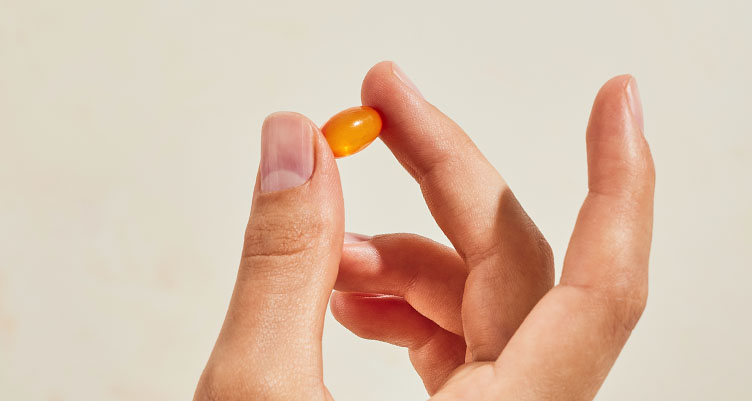The Best Time to Take Vitamin D

- Low vitamin D levels can affect your entire body, including your sleep. Supplementing can help.
- The best time to take vitamin D depends on your body and lifestyle. However, Vitamin D is a fat-soluble vitamin that’s best absorbed by your body when you take it with a meal.
- Keep reading to find out when to take vitamin D, plus tips to naturally increase your levels.
A large percentage of the U.S. population is low in vitamin D. That’s a problem because low vitamin D levels, including vitamin D deficiency, can affect everything from your mood to your sleep quality—yikes. Unless you have access to adequate sun exposure, taking a vitamin D supplement is an easy way to get enough vitamin D (aka the “sunshine vitamin”) every day. However, there are nuances around the best time to take vitamin D and how much to take. Here’s what you need to know.
What happens if you have a vitamin D deficiency?

Research shows that about 42% of U.S. adults have inadequate levels of vitamin D.[1] What causes vitamin D deficiency?
There are several reasons you may not be getting the optimal amount. First, you may not be getting enough exposure to the sun. In addition, since this key vitamin is not easily found in many foods, your diet could be a contributing factor.
What happens if you’re deficient in vitamin D? Because it’s essential for many biological processes, your immune function and bone health could be impacted.[2][3] But if you learn how to take vitamin D correctly as part of a well-rounded supplement routine, you can set your body and brain up for success.
When to take vitamin D and why it matters

Your body makes vitamin D when your skin is exposed to the sun, which is why you’ll often hear this vitamin referred to by its friendly nickname, the “sunshine vitamin.” Because vitamin D supports functions throughout your entire body, vitamin D benefits include everything from immunity and muscle strength to calcium absorption, which is essential for bone health.
But consistent sun exposure can be hard to come by depending on where you live, your daily schedule and the time of year. And even if you do have great sun exposure, factors like sunscreen, time of day and even the clothes you wear can all interfere with your body’s ability to naturally produce vitamin D.
You consume vitamin D in foods like egg yolks and fatty fish, such as salmon and mackerel. However, it can be difficult to get enough from food sources alone. Vitamin D dietary supplements make it easy to get enough vitamin D.
Instead of taking a broad-spectrum multivitamin (which don’t necessarily include meaningful amounts of the right nutrients), we recommend a targeted vitamin D supplement like Bulletproof Vitamins A-D-K. Vitamins A, D and K work better together, and you get science-backed doses of each in one convenient softgel.
Always be sure to follow the manufacturer recommendations printed on the label and get medical advice from your doctor or a dietitian about whether supplementation is right for you and how much vitamin D you need.
The best time to take vitamin D

The best time to take vitamin D supplements is when it fits your schedule. We recommend taking it with a source of quality fat in the morning or when you break your fast. Avoid taking vitamin D in the evening (we’ll talk about why below).
Since vitamin D is a fat-soluble vitamin—meaning it doesn’t dissolve in water—your body can most easily absorb it when you take it with food. On top of that, many people find that taking vitamins and supplements on an empty stomach can lead to side effects like gastric upset.
It’s convenient to remember to take your vitamins and dietary supplements in the morning, either with breakfast or a cup of Bulletproof Coffee. But you don’t have to take it in the morning. If you’re curious about supplementing while fasting, just take it when you break your fast.
You may also want to take it with your largest meal of the day, whenever that is for you, since research has found that this can improve vitamin D absorption.[4] More specifically, researchers suggest taking vitamin D at the same time you eat foods that are high in fat.[5] Whenever you take vitamin D supplements, consider taking them while eating quality fat sources, including avocado, Bulletproof Brain Octane C8 MCT Oil, egg yolks, wild-caught fatty fish, grass-fed butter and Bulletproof Grass-Fed Ghee.
When to take vitamin D: Morning or afternoon. In reality, the time of day you take vitamin D depends on your schedule. Our only hard recommendation: Avoid supplementing with vitamin D at night. There’s evidence that vitamin D can suppress melatonin—which is bad news for your sleep quality. Keep reading to learn more.
Vitamin D and sleep: The surprising connection

Does vitamin D help you sleep better? Early research suggests it is inversely related to melatonin, your sleep hormone. Increasing vitamin D levels may suppress melatonin levels.[6] So, it makes sense that taking it at night could disrupt your sleep.
That said, you still want to get enough vitamin D because your levels are directly related to the amount and quality of sleep you’re getting. Researchers have found that low levels of vitamin D are linked with poor sleep quality. In one study, participants who increased their vitamin D levels saw significant improvement in sleep and neurologic symptoms.[7]
In another study, researchers looked at the vitamin D levels and sleep quality of 3,048 men 68 years and older.[8] They measured total sleep time, wake times and frequency and “sleep efficiency,” which measures the time spent in bed versus the time spent sleeping. The study found that low levels of vitamin D were linked with poor quality sleep and sleeping less than five hours a night. Low levels of vitamin D were also associated with lower sleep efficiency scores.
We know that vitamin D and sleep quality are linked, but we’re only really just beginning to understand how and why that’s the case. Researchers believe that vitamin D may affect our shut-eye by interacting with the areas of the brain that regulate sleep. We also know that vitamin D plays a key role in supporting the immune system, and managing inflammation may support better sleep quality.
So, get enough vitamin D—just take it in the morning or afternoon. At night, take supplements that support sleep quality and muscle relaxation, like magnesium and melatonin (which you’ll find in soothing, sippable Bulletproof Sleep Collagen Protein).
Related: The Best Sleep Supplements and Practices for Quality Rest
Take charge of your wellness with vitamin D

If you are unsure of where to start, get your baseline levels. Ask your doctor or healthcare provider for updated blood tests every six months or so—they’ll check your blood levels of vitamin D and other key nutrients, vitamins and minerals your body needs to function. You can also test your blood levels at home using a self-testing service like WellnessFX.
The recommended daily amount of vitamin D is 600 IU (15 micrograms) for those between the ages of 1 to 70.[9] If your levels are low, take Bulletproof Vitamins A-D-K for an easy way to up your vitamin D3, the form more easily utilized by your body. You get 5,000 IU of vitamin D, plus complementary doses of vitamin A and vitamin K.
Sunlight (and other types of light) can affect your mood, sleep quality and even hormone function. Get the details about light therapy for better energy, sleep and mood.
Sign-up for the Bulletproof mailing list and receive the latest news and updates!
This article has been updated with new content.



